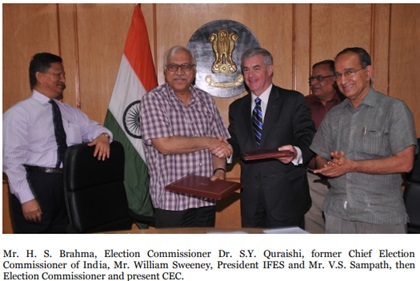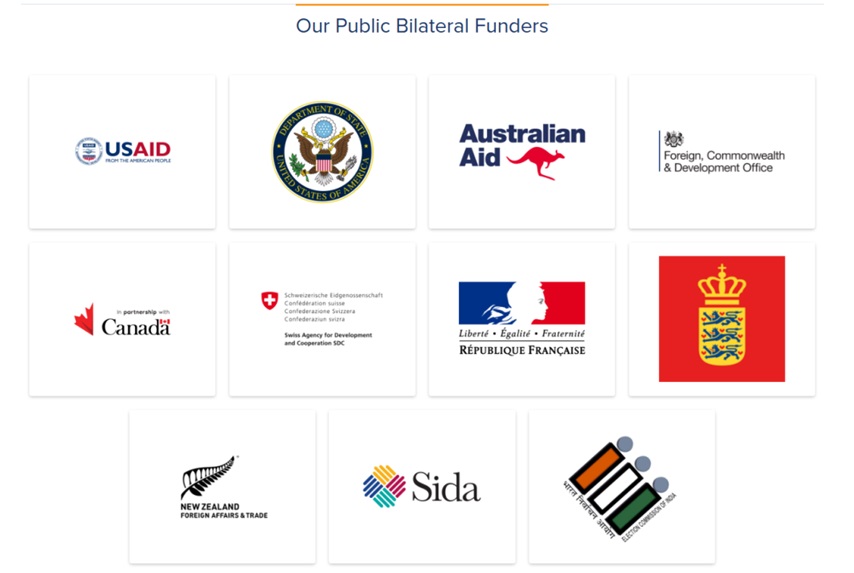The Department of Government Efficiency (DOGE) in the United States recently published a post on X, revealing a list of funding initiatives that were stopped or canceled. Among these, one particular allocation has drawn significant attention in India. According to DOGE’s post, $486 million was given to the Consortium for Elections and Political Process Strengthening (CEPPS), with $21 million specifically allocated for ‘voter turnout’ in India—equivalent to ₹182 crores as per today’s exchange rate.
US taxpayer dollars were going to be spent on the following items, all which have been cancelled:
– $10M for “Mozambique voluntary medical male circumcision”
– $9.7M for UC Berkeley to develop “a cohort of Cambodian youth with enterprise driven skills”
– $2.3M for “strengthening…— Department of Government Efficiency (@DOGE) February 15, 2025
What Is CEPPS?
Established in 1995, CEPPS describes itself as a coalition of nonprofit, nonpartisan, and nongovernmental organizations dedicated to promoting democratic institutions and governance worldwide. According to its now defunct “About Us” page, the organization is composed of three leading international groups: the International Foundation for Electoral Systems (IFES), the International Republican Institute (IRI), and the National Democratic Institute (NDI). These entities serve as operational fronts for CEPPS in different countries.
CEPPS claims to support democratic development by collaborating with political parties, election management bodies, parliaments, civil society organizations, and democracy activists. It has reportedly operated in over 140 countries, delivering extensive democracy, rights, and governance (DRG) programming. CEPPS primarily works with USAID and other international donors, securing large-scale funding for its initiatives.
Notably, CEPPS has received over $2 billion in funding from USAID since its inception. However, in a curious development, CEPPS’s official website became nonfunctional after 23 January 2025. The last known archive of its website was recorded on archive.org on that date, raising questions about the organization’s sudden disappearance from public access.
CEPPS’s Role In Election Interference
A document titled Review of the Fiscal Year 2024 United States Agency for International Development Budget, dated 26 April 2023, explicitly states that USAID has provided $2 billion to CEPPS for its Elections and Political Processes (EPP) programs. In the 2021 financial year alone, CEPPS received 66% of USAID’s EPP funding.
While CEPPS presents itself as a promoter of democracy, a deeper look at the documents suggests that it plays a far more active role in influencing elections worldwide. CEPPS does not just assist election commissions; it actively engages with political parties, civil society groups, and election monitoring bodies. This raises concerns about potential foreign interference in elections under the guise of democracy promotion.
The Democratic Elections and Political Processes (DEPP) program, through which CEPPS operates, appears structured to provide funding and support to selected political groups, potentially tilting election outcomes in their favor. A 2019 USAID Inspector General report even warned that relying on a single entity like CEPPS for political party assistance exposes USAID to significant risks, including credibility loss and allegations of election interference. Despite this, CEPPS continued receiving a dominant share of USAID’s election-related funding, securing 66% of its budget in 2021.
CEPPS In India
CEPPS operates through its three constituent organizations—IFES, IRI, and NDI. According to audit reports, CEPPS allocated $318,614 for its activities in India in FY 2018, with funding funneled through IFES.

A key development in CEPPS’s engagement with India occurred in May 2012, when the Election Commission of India (ECI) signed a Memorandum of Understanding (MoU) with IFES in New Delhi. The agreement was signed by then-Chief Election Commissioner SY Quraishi and IFES President and CEO William Sweeney. The MoU aimed to facilitate knowledge exchange, joint training programs, research, and capacity-building initiatives via the India International Institute of Democracy and Election Management (IIIDEM), an ECI-established body.

While IFES is officially funded by USAID, it also receives financial support from various private entities. A review of IFES’s “Our Partners & Donors” section reveals that its funding sources include USAID, the U.S. Department of State, Australian Aid, and the Election Commission of India itself. However, a more concerning revelation is IFES’s backing from corporate and private donors, including Google, Meta, Microsoft, and Open Society Foundations (OSF)—the latter being owned by billionaire George Soros, who has been accused of funding anti-India activities.

The involvement of an organization linked to Soros in India’s electoral processes has raised serious concerns about the extent of foreign influence over Indian elections. Given its financial backing from both public and private entities with potentially conflicting interests, IFES’s real role and motives in India warrant closer scrutiny.
The Election Commission of India’s partnership with IFES did not end with the 2012 MoU. The collaboration has persisted through IIIDEM and International IDEA, a global intergovernmental organization. While the Indian government is not directly engaging with IFES, ECI’s independent dealings with IIIDEM suggest that foreign-backed electoral collaborations continue to exist.
(With inputs from OpIndia)
Subscribe to our channels on Telegram, WhatsApp, and Instagram and get the best stories of the day delivered to you personally.